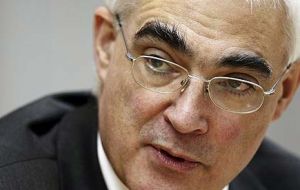MercoPress. South Atlantic News Agency
Lloyds planning huge shares and bonds issue to cut off from government umbrella
 Chancellor Darling favours creating three new high street banks to increase competition and recoup bail-out funds
Chancellor Darling favours creating three new high street banks to increase competition and recoup bail-out funds Lloyds Banking Group is prepared to pay a fee of close to £2.5 billion to steer clear of the Government Asset Protection Scheme (GAPS), according to BBC sources. Lloyds believes it can survive without the GAPS and does not want the additional government influence which comes with the scheme.
The taxpayer already holds a 43% stake in the bank. A decision on whether the arrangement goes ahead will be announced early next week, says the BBC's Nils Blythe.
Share issue
The protection scheme, agreed in March, provides taxpayer guarantees against potential losses on some Lloyds’ assets.
The original idea was that the bank would pay for the guarantee by issuing new, non-voting shares that would give the taxpayer a majority stake in the troubled bank.
But Lloyds is currently talking to its major private sector shareholders about whether they will buy into a huge new share issue, in which the bank hopes to raise around £13 billion, the biggest fund-raising of its kind to date, says BBC business correspondent Nils Blythe.
In addition, Lloyds will issue new bonds which will bring the total fund raising to more than £20 billion.
With the extra cash raised by private shareholders, Lloyds feels it would then be in a position to decline additional government protection.
The £2.5bn fee would be in recognition of the guarantees provided by the GAPS since March. Lloyds has been struggling since it bought HBOS last September. HBOS made a record loss in 2008 of almost £11 billion.
Lloyd’s bank’s decision to cut government influence apparently anticipates UK Chancellor of the Exchequer Alistair Darling announcement that three new high street banks are set to be created with the sale of taxpayer's holdings in the sector.
The purpose of creating new banks is to carve up the state-controlled banks in a bid to increase competition and recoup the costs of the UK Treasury's multibillion-pound bail-out added Darling.
The new banks would be created over the next few years as Northern Rock, Royal Bank of Scotland and Lloyds Banking Group are re-privatised. Northern Rock, which is 100% taxpayer-owned, could be broken up and ready for sale by the end of this year.
Private investment is also being sought to reduce the taxpayer's exposure to RBS and Lloyds, which are both majority-owned by the state. Darling indicated that different parts of both banks would be sold separately to newcomers to the sector as part of its “reconstruction”.
“What you really want to do is have quite a substantial divestment - perhaps branches or perhaps particular institutions that they own - made available to other people,” Mr Darling told BBC1's The Politics Show.
“Because unless we get competition we are going to end up with half a dozen big providers which would be a big reduction in choice and that would not be acceptable.”
Mr Darling said he would not countenance “fire sales” of any of the taxpayer's banking assets, although it would soon be in a position to dispose of part of Northern Rock. Potential buyers are thought to include Tesco and Virgin, as well as foreign buyers, possibly from the US, Australia and the Middle East.




Top Comments
Disclaimer & comment rulesCommenting for this story is now closed.
If you have a Facebook account, become a fan and comment on our Facebook Page!